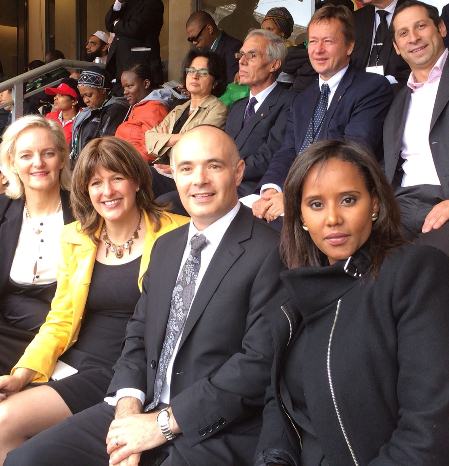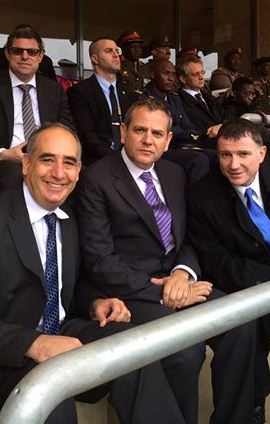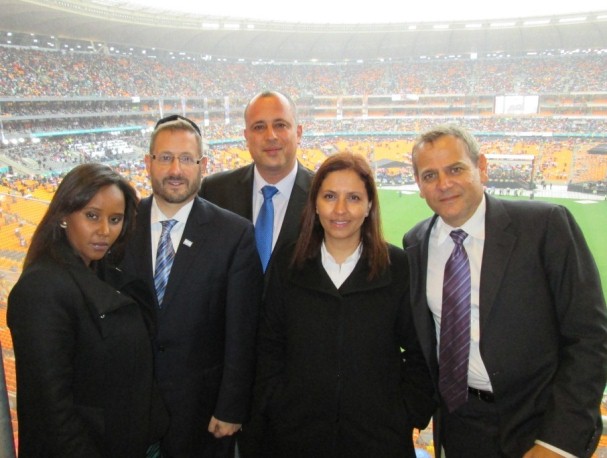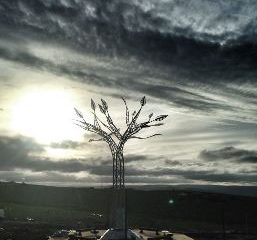
OpEds

Celebrating the loss of Madiba the South African Way
Published
10 years agoon
By
adminGEOFF SIFRIN
ALL PICTURES BY BEN SWARTZ
One of the noticeable things characterising many tributes in South Africa to Nelson Mandela since he died last Friday is exuberant singing and dancing – to an outsider it would seem like a festival. What it shows is the ability of African culture to celebrate a life well lived rather than being dragged into a cauldron of despair. That energy was on display at the state memorial to Mandela on Tuesday at the FNB stadium in Johannesburg, where tens of thousands participated despite pouring rain.
For the western mindset, as for the Asian one, it is hard to imagine that when a great man has died, people will dress in colourful garments, beads and bangles, and everywhere you look there will be dancing and singing in his name. Africa has something to teach the world.
One didn’t have to be in the stadium to feel it. It was everywhere. Someone living in Johannesburg, for example, could drive to the neighbourhood of Houghton and join the crowds outside his house. You would find hundreds of people around a mountain of flowers, notes and candles. Black, white and brown people smiled, rubbed shoulders, hugged, sang and danced; a blond white girl laid down a bunch of flowers, then a black woman lit a candle, then an elderly white man asked a stranger to take a picture of him so he could show his grandchildren, then two friends, one white, the other black, wrote a message to Madiba on a big white board.
It reminded me of a message scrawled on a concrete pillar in Rosebank Mall’s entrance in June when the world thought he was about to die, saying: “Madiba, if it had not been for you, I would not be dating a white girl – Thabo.”
There were other kinds of tributes, like the Johannesburg Jewish community’s at Oxford shul on Sunday. When the 2 000 Jews packed in to hear former SA president Thabo Mbeki, Chief Rabbi Warren Goldstein and other dignitaries eulogising Mandela, among them was a frail, wheelchair-bound Rabbi Norman Bernhard, who hadn’t been seen publicly for years because of ill health. Mandela’s passing was so profound an event that whatever effort it took, one simply had to be there. Bernhard was one of the rabbis who, during apartheid, spoke out against it.

Pictured are the SAJBD delegates Mary Kluk, chair & Wendy Khan, executive director; Israel’s deputy head of mission in Pretoria Michael Freeman; Pnina Tamano-Shata (Deputy Speaker of Knesset in foreground & board president Zev Krengel sitting next to the German Ambassador in the background
The central question Mbeki put to the audience was whether South Africa today had the leadership necessary to follow Mandela’s vision. The clear undertone of his message was that the current leadership didn’t match up.
The event at the stadium was important for South Africa’s sense as a nation. The world celebrities, representing over 90 countries, brought respect and admiration – not just for Mandela, but by extension for all South Africans. A leader can only go where his followers allow, and South Africans let him take them to places once unthinkable.
The African exuberance in the FNB stadium was boundless. The bleachers shook with song and dance. The master of ceremonies, ANC stalwart Cyril Ramaphosa, had to call on the crowd several times for “discipline”, pleading with them to quieten down so speakers could be heard. At one point a brass band at the far end of the stadium was playing loudly as the Indian president was about to speak, Ramaphosa bluntly ordered them to stop, saying their “beautiful music” could resume later. They put down their trumpets and cymbals.
Can you imagine a crowd of Americans behaving like that at a state memorial in Washington? Or a crowd of Chinese in Beijing? Here, it was not disrespectful, rather a display of togetherness which brought a smile to most peoples’ lips, even if it sometimes crossed the line.
On his way to the podium, US President Barack Obama shook the hand of Cuban President Raul Castro, an extraordinary gesture for leaders of two nations which have long been enemies – another illustration of Mandela’s achievement. As one man remarked outside his house on Sunday night: “Even in his death he succeeds in bringing people together who otherwise would refuse to stand next to each other!”
Obama hailed Mandela as a “giant of justice”. However, he said, too many leaders in the world claimed solidarity with his struggle for freedom “but do not tolerate dissent from their own people.” He spoke in front of an audience that included the leaders of decidedly autocratic countries like China and Zimbabwe.
Other speakers were UN Secretary-General Ban Ki-moon, Chinese Vice President Li Yuanchao, the Cuban president, and the presidents of Brazil, Namibia and India. There were tributes from Mandela’s grandchildren. Finally, South African President Jacob Zuma gave the keynote address.
 Who could have guessed in the 1960s and 1970s at the height of apartheid that this is how the farewell to then-prisoner Nelson Mandela would look?
Who could have guessed in the 1960s and 1970s at the height of apartheid that this is how the farewell to then-prisoner Nelson Mandela would look?
Pic: Foreground – Ambassador Lenk, MK Nitzan Horowitz, Yuli Edelstein (Speaker of the Knesset, Likud), Background, Avrom Krengel, SAZF chair
SA Jews were as caught up in the memorial’s passions as anyone. Many Jewish leaders were at the stadium. Behind the scenes, however, there was a note of disappointment among some, who had assumed that when the world dignitaries came, Israel’s leaders would be among them. But on Monday Israeli PM Benjamin Netanyahu announced he wouldn’t be coming, citing the trip’s high cost.
Many see the underlying reason for his absence as more political than financial. The Israeli-Palestinian conflict is complicated, as is the troubled relationship between Israel and South Africa.
By saying the trip was too costly, Netanyahu touched a sensitive spot in SA Jews, who have been among Israel’s most dedicated financial supporters. Many felt that after all the aid SA Jews have given Israel, surely it could spend the cash to send its Prime Minister to honour South Africa’s greatest leader, as the whole world was doing?
Fundraising for Israel has been a cornerstone of SA Jewry’s Zionism. Prior to 1948, it was second only to the United States in absolute figures. In the first decade of Israel’s existence, it led the major world communities in per capita contributions, coming close to equalling the amounts raised in larger Jewish communities like Britain and Canada. It held a per capita record on fundraising until the end of the 1980s. This is aside from the other ways in which it has supported Israel.
As things turned out, the situation was alleviated through efforts of members of the Jewish community and the Israeli ambassador, who arranged for a delegation of Israeli MKs from different parties to represent Israel, including Speaker of the Knesset Yuli Edelstein, Hilik Bar of the Labour Party, Gila Gamliel of Likud, Nitzan Horowitz of Meretz, and Dov Lipman and Penina Tamanu-Shata of Yesh Atid. Tamanu-Shata is the first Ethiopian woman in the Knesset.
On Sunday, Mandela’s funeral will take place at Qunu in the Eastern Cape. For a brief moment in history, the world is looking at South Africa in admiration for the great man it produced. The Empire State building lit up its top floors in the South African flag’s colours; the Eiffel Tower made a comparable gesture; similar things are being done worldwide. South African supermarket chains such as Woolworths and Shoprite have announced that all their stores countrywide will be closed on Sunday as a mark of respect.
Now that the “father of our nation” is gone, the question peering at South Africans from every corner is: What comes next? Do they have the wherewithal to live by the principles and values he lived by, to do justice to his legacy? Do they have the “discipline” Madiba emphasised so often? Only time will tell.

Pictured at the “Calabash” stadium are members of the Israeli delegation, from left: M.K. Pnina Tamano-Shata (Deputy Speaker of the Knesset) (Yesh Atid), MK Rabbi Dov Lipman (Yesh Atid), MK Hilik Bar (Labour), MK Gila Gamliel (Likud) & Nitzan Horowitz (Meretz)








